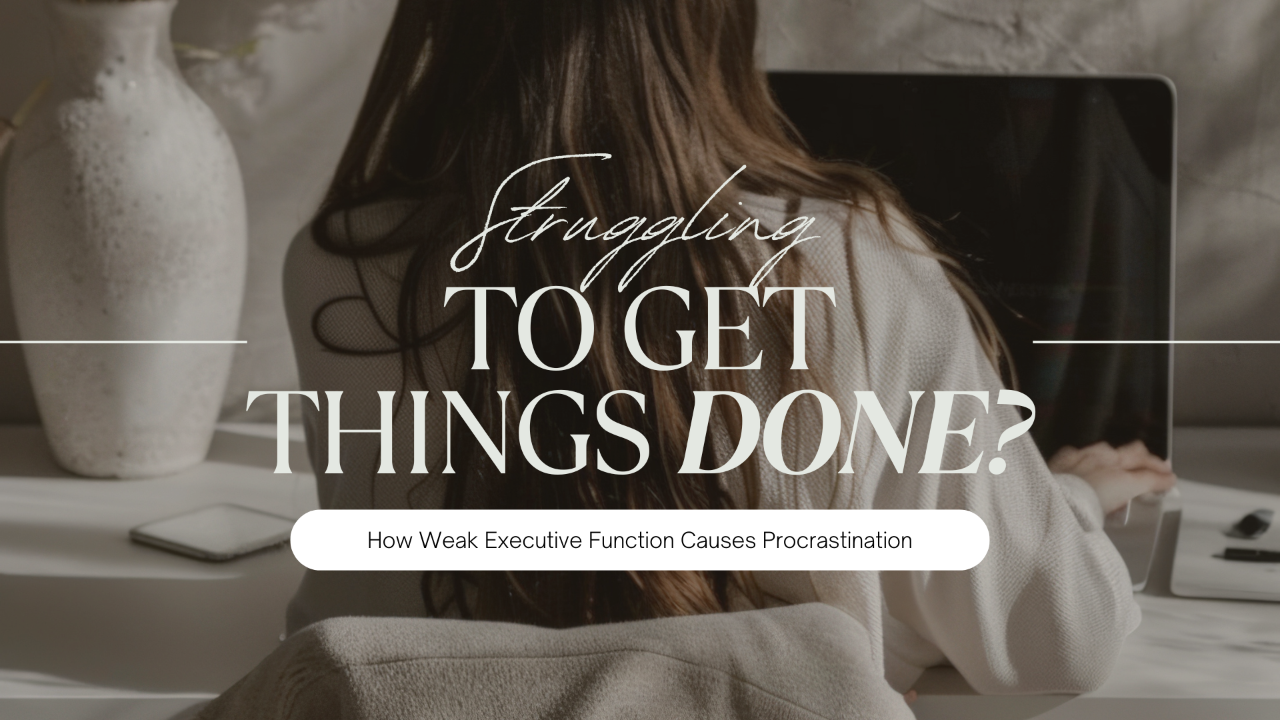Struggling to Get Things Done?
Nov 23, 2024
Have you ever wondered why you delay important tasks, even when you know they matter? Procrastination can feel like a constant battle—wanting to act but being unable to move forward. For many, the root cause lies not in lack of effort or ambition but in weak executive function.
Let's break it down and Talk About How to Strengthen It ⬇️
Executive function is your brain’s ability to plan, organize, manage time, and regulate emotions—essentially, the mental processes that help you get things done. When this system is compromised, procrastination often follows. Let’s dive into what executive function is, why it weakens, how it links to procrastination, and most importantly, how you can strengthen it.
What Is Executive Function?
Executive function is like your brain’s command center. It includes skills such as:
Working memory: Holding and using information to complete tasks.
Cognitive flexibility: Adapting to new situations or shifting focus when needed.
Self-control: Managing emotions, impulses, and behavior to stay on track.
These skills work together to help you plan, prioritize, and execute tasks effectively. When your executive function is strong, you can break down large goals into manageable steps, adapt when things don’t go as planned, and regulate emotions that might otherwise derail your focus.
How Executive Function Weakens
Executive function can be weakened by a variety of factors, including:
- Chronic stress or overwhelm: High levels of stress drain cognitive resources, making it harder to focus or think clearly.
- Early experiences: Childhood trauma, neglect, or instability can disrupt the development of key executive function skills.
- Mental overload: Taking on too many tasks at once or managing complex decisions can exhaust your working memory, leaving little room for effective action.
- Lack of structure or routine: Without consistent systems, it’s harder to train your brain to prioritize and follow through.
- Fear of failure or perfectionism: Emotional blocks can hijack self-control and working memory, leading to hesitation or avoidance.
When executive function is weakened, your brain struggles to filter out distractions, manage competing priorities, and regulate emotional responses. This creates a perfect storm for procrastination.
The Link Between Weak Executive Function and Procrastination
Procrastination is often the byproduct of weak executive function. Here’s how the two are connected:
- Overwhelming Cognitive Load: Tasks that require planning or problem-solving demand working memory. If your brain is overloaded or disorganized, it’s harder to process and act on what needs to be done.
- Emotional Dysregulation: When self-control weakens, emotions like fear, doubt, or frustration take over. This can lead to avoidance behaviors, like distracting yourself with easier tasks or numbing out altogether.
- Inflexibility in Thinking: If cognitive flexibility is low, you may feel stuck when a task doesn’t go as expected, leading to delay instead of adaptation.
- Difficulty Prioritizing: Weak executive function makes it challenging to determine which tasks matter most. This can result in focusing on low-priority activities while avoiding meaningful work.
- Trouble Breaking Down Tasks: Without strong executive function, big projects can feel overwhelming because it’s hard to break them into smaller, manageable steps.
The result? Procrastination becomes a default coping mechanism—not because you’re lazy or unmotivated, but because your brain’s command center is struggling to keep up.
How to Strengthen Executive Function
The good news is that executive function can be improved with intentional strategies and practices. Here’s how to get started:
- Lighten Your Cognitive Load- Simplify decision-making by creating systems and routines. For example, use task lists, prioritize 1–3 key goals per day, and establish a consistent schedule. This reduces the mental effort required to stay organized.
- Break Down Big Tasks Into High Impact | Low-Effort Ways- Overwhelm weakens working memory. Combat this by dividing large projects into smaller, actionable steps. Focus on completing just one step at a time, and celebrate small wins to build momentum.
- Practice Emotional Regulation- Procrastination is often tied to emotional resistance. When fear, doubt, or frustration arises, practice grounding techniques like deep breathing or reframing your thoughts. Remind yourself that progress, not perfection, is the goal. (I will show you exactly the system that has helped hundreds move past procrastinating and get going on their dream goals in Abolish Procrastination. Check out the next program start date!)
- Train Cognitive Flexibility- Challenge your brain to adapt by engaging in problem-solving activities or stepping outside your comfort zone. Start small—try a new approach to an everyday task or work through a mild challenge to build adaptability over time.
- Build Self-Control Gradually- Strengthening self-control takes practice. Begin with small commitments that are easy to stick to, like working on a task for just 5–10 minutes. Over time, you’ll increase your ability to stay focused and resist distractions.
- Establish Accountability- Share your goals with a trusted mentor, coach, or community. External accountability can help you stay on track when your executive function feels weak.
Start Strengthening Your Executive Function Today
If you’re tired of procrastination holding you back, it’s time to address the root cause. By building small, intentional habits, you can create a strong foundation for focus, clarity, and consistent action.
This is exactly what we tackle in the Abolish Procrastination program. Starting January 2, 2025, we’ll dive into the tools and strategies you need to strengthen your executive function and finally break free from the patterns that keep you stuck. Through mindset shifts, emotional regulation techniques, and practical systems, you’ll learn how to take meaningful action toward your biggest goals.
Don’t let procrastination control another year of your life. Join us on January 2, 2025, and start transforming the way you think, plan, and act. Let’s make this the year you move forward!


